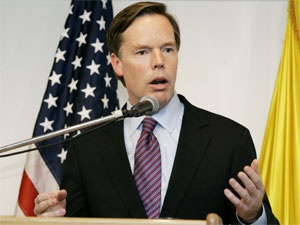
"The Turkish people have just concluded important, even historic elections. These elections demonstrated the strong health of Turkey's democracy, the most impressive in the Muslim world. ... We look to Turkey, with its 160-year legacy of modernizing reform, as the most successful example in the world today of a secular democracy within a Muslim society that can inspire reformers in the greater Middle East and beyond," he said.
He was speaking at the Atlantic Council in Washington, D.C. to an audience including several former US ambassadors to Turkey and current Turkish Ambassador to the United States Nabi Şensoy. Introduced by former US Ambassador to Turkey Marc Grossman, Burns added that the United States government looks forward to a "very close relationship" with President Abdullah Gül and Prime Minister Recep Tayyip Erdoğan.
"The Justice and Development Party (AK Party) now controls the government, Parliament, and presidency. At the same time, Turkish voters sent a message of moderation during the recent elections. While the AK Party won a resounding victory, opposition parties received over 50 percent of the vote and with more parties crossing the 10 percent electoral threshold, the new Parliament is more representative of Turkey's diverse voter sentiment," he said. "Turkey's voters thus appear to have signaled their desire for Prime Minister Erdoğan and President Gül to deepen Turkey's secular democracy by rejuvenating political and economic reforms, but in the context of Turkey's Muslim society."
Highlighting Turkey's importance to the United States, Burns said the 21st century Middle East has replaced 20th century Europe as the most critical region to America's core national security interests. Calling Turkey unique in its "dual identity as both a Middle Eastern and European country" he said, "Turkey is the only country in the region that can work effectively with all of the others in the Middle East."
Emphasizing that the United States is among the strongest supporters of Turkey's European Union aspirations, he said that to reach that strategic objective, Turkey should repeal Article 301 of the penal code, "which restricts freedom of expression and has led to outlandish legal cases against private citizens and global figures such as Nobel laureate Orhan Pamuk." Burns added that Turkey will help make its own case with the EU by reopening the Halki Theological School on Heybeliada Island near İstanbul. The seminary was closed to new students in 1971 under a law that put religious and military training under state control. The seminary once trained generations of Greek Orthodox leaders, including the current Fener patriarch, Bartolomeos. The seminary remained open until 1985, when the last five students graduated.
The US encouraged Turkey to normalize its relations and reopen its border with Armenia, Burns said, adding, "The US must not inflame matters by proclaiming Turkey's past treatment of Armenians as 'genocide' or interfering in its sovereignty on delicate internal matters."
The House of Representative's Resolution 106, pending at the US Congress, would make a political determination that the tragedy of 1915 constitutes genocide. Burns said the passage of the resolution would undercut voices emerging in Turkey for dialogue and reconciliation concerning the events, "We therefore have recommended to Congress that it not pass such a resolution," he stated.
Nevertheless, he said the United States and Turkey still need to work out some tactical differences in handling Iran. He said the United States has been urging all of its allies, including Turkey, not to reward Iran by investing in its oil and gas sector, "while Iran continues to defy the United Nations Security Council by continuing its nuclear research for a weapons capability."
Burns also noted that US intervention in Iraq triggered an unprecedented wave of anti-Americanism in Turkey. He said official relations have recovered from the low point of the Turkish Parliament's vote on March 1, 2003 to reject the United States' request to move US forces into Iraq via Turkey.
Since then, he said, Ankara has been a strong supporter of our efforts to stabilize Iraq and safeguard Iraq's territorial integrity. He also gave assurances that the United States condemns the Kurdistan Workers' Party (PKK) as a terrorist group: "We mourn the loss of innocent Turkish lives in these attacks. We remain fully committed to working with the governments of Turkey and Iraq to counter PKK terrorists, who are headquartered in northern Iraq. We are making progress in putting in place the mechanisms required to produce such concrete results against the PKK."
Burns is expected to travel to Ankara next week to personally deliver his message of support to the new government. He also said he intends to travel to Cyprus to communicate to both Turkish and Cypriot leadership the strong wish of the United States for peace on the divided island after decades of strife.














